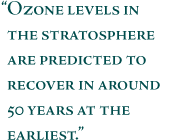|
Predictions and Monitoring
Our best predictions of the amounts of UV-B we should experience in the
near future are based on our predictions of the extent of ozone
recovery, as well as on cloud cover. Ozone levels in the stratosphere
are predicted to recover in around 50 years at the earliest. This
expected recovery depends on full compliance by all national signatories
to the international agreement known as "The
Montreal Protocol" and subsequent amendments, which limit the
production of chemicals that deplete stratospheric ozone. Greenhouse
gas emissions may delay the recovery of ozone by 15 to 20 years beyond
2050. Although greenhouse gases warm the lower atmosphere, they cool
the stratosphere. Cooling increases cloud formation in the
stratosphere, and ozone-depleting chemical reactions take place on ice
crystal surfaces in those clouds.

Instruments aboard NASA’s
EOS-Aura satellite will measure the amount of UV radiation that reaches
the Earth’s surface. They will also help to determine whether the
stratospheric ozone layer is now recovering, as predicted by scientific
models. (Image courtsy Jesse Allen, NASA GSFC Visualization and Analysis Lab)
Data from NASA’s satellites, coupled with observations on the ground,
are essential to resolve critical questions about the impacts of
increased ultraviolet radiation due to ozone depletion. The suite of
TOMS (Total Ozone Mapping Spectrometer) missions will provide us with
ozone and UV-B surface exposure data. NASA’s Aura mission, to be
launched in 2003, will monitor the status of stratospheric ozone and
will enable the scientific community to determine whether or not the
ozone layer is recovering as scientific models predict. Until the ozone
layer recovers, Aura will help us to better predict how much UV-B
exposure we can expect to receive at the surface.
next: References
back: How Much Are We
Getting? |
|

Ultraviolet Radiation
Introduction
Effects on the Biosphere
What Determines UV at the Surface?
How Much Are We Getting?
Predictions and Monitoring
References
|

